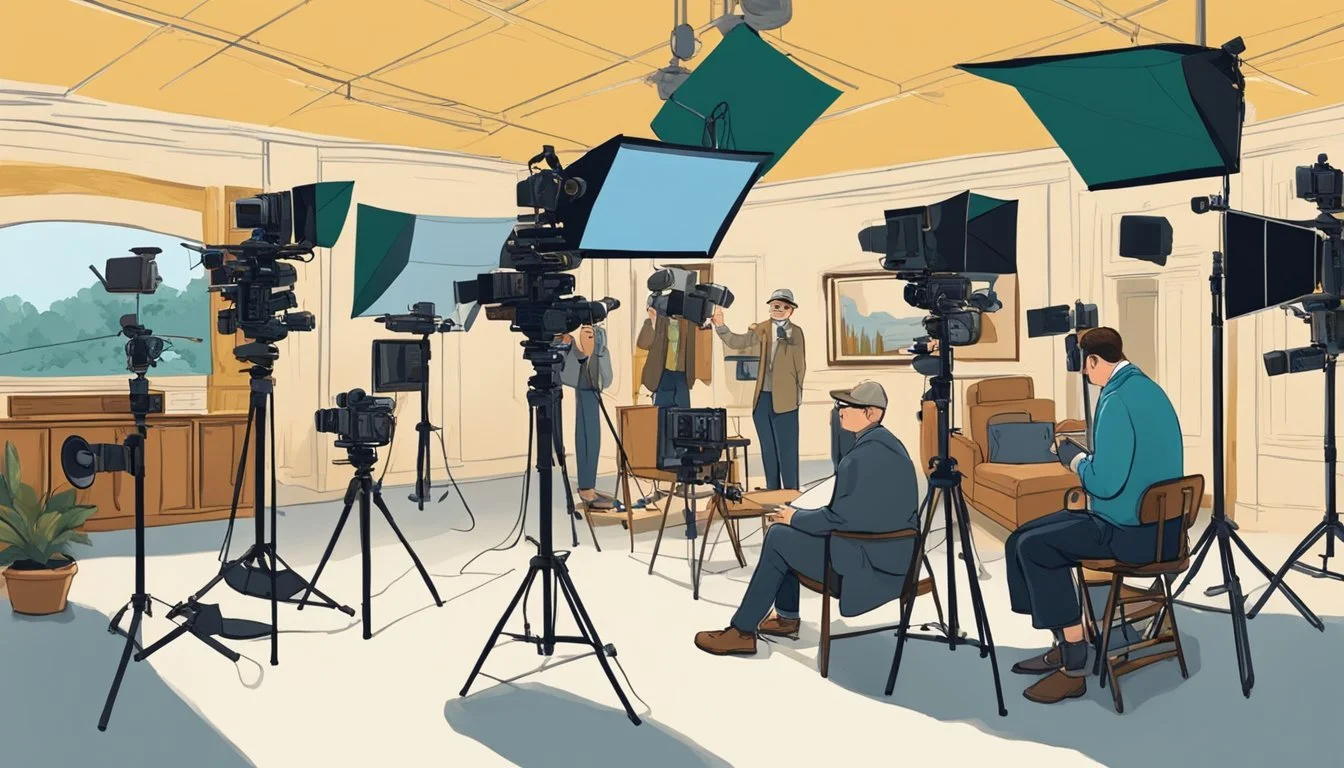Unveiling the Enigma: The Truman Capote Documentary Reveals Secrets of a Literary Legend!
Truman Capote, the renowned author of "Breakfast at Tiffany's" and "In Cold Blood," has been the subject of several compelling documentaries. These films offer intimate glimpses into Capote's life, work, and relationships, providing viewers with a deeper understanding of the complex literary figure.
One notable documentary is "The Capote Tapes" (2019), directed by Ebs Burnough. This film draws on newly discovered interviews with Capote's friends, conducted by Paris Review co-founder George Plimpton. It explores Capote's rise to literary fame and his eventual fall from grace, painting a nuanced portrait of the author's triumphs and struggles.
Another significant documentary is "A Visit with Truman Capote" (1966), created by Albert and David Maysles and Charlotte Zwerin. This 29-minute film offers a rare, up-close look at Capote during the height of his career, capturing his wit, charm, and unique personality. These documentaries serve as valuable resources for those interested in Capote's life and legacy, shedding light on the man behind the iconic works.
Truman Capote: A Brief Biography
Truman Capote was born Truman Streckfus Persons on September 30, 1924, in New Orleans, Louisiana. He had a challenging childhood, often feeling neglected by his mother and abandoned by his father.
At a young age, Capote discovered his passion for writing. He began working as a copyboy for The New Yorker magazine in his teens, which helped launch his literary career.
Capote's first novel, "Other Voices, Other Rooms," was published in 1948 and received critical acclaim. This success established him as a promising young writer in the literary world.
In 1958, Capote published "Breakfast at Tiffany's," a novella that became one of his most beloved works. The story was later adapted into a popular film starring Audrey Hepburn.
His magnum opus, "In Cold Blood," was published in 1966. This non-fiction novel chronicled the brutal murder of the Clutter family in Kansas and revolutionized the true crime genre.
Capote was known for his flamboyant personality and high-profile social life. He often mingled with celebrities and socialites, becoming a fixture in New York's elite circles.
Throughout his career, Capote struggled with alcohol and drug addiction. These issues, combined with personal and professional setbacks, affected his later work and relationships.
Truman Capote passed away on August 25, 1984, in Los Angeles, California. He left behind a legacy as one of America's most influential and innovative writers of the 20th century.
The Evolution of Capote Documentaries
Documentaries about Truman Capote have evolved significantly over the years. In 1966, the Maysles brothers created "A Visit with Truman Capote," offering an intimate look at the author's life and work.
This early film set the stage for future explorations of Capote's complex persona. It provided viewers with a rare glimpse into his world, capturing his wit and charm on camera.
More recent documentaries have delved deeper into Capote's life and legacy. "The Capote Tapes" (2019) stands out as a notable example. This film utilizes previously unheard audio recordings to paint a comprehensive portrait of the writer.
"The Capote Tapes" explores Capote's impact on literature and society. It features interviews with those who knew him personally, offering unique insights into his character and relationships.
Documentary filmmakers have increasingly focused on Capote's unfinished novel, "Answered Prayers." This work and its consequences have become a central theme in many recent films about the author.
As techniques and resources have advanced, Capote documentaries have become more nuanced. They now incorporate a wider range of voices and perspectives, providing a more balanced view of the writer's life and work.
In-Depth Look at 'The Capote Tapes'
'The Capote Tapes' offers a captivating exploration of Truman Capote's life and work. This documentary, distributed by Greenwich Entertainment, weaves together interviews, archival footage, and audio recordings to paint a nuanced portrait of the acclaimed author.
The film draws from a wealth of source material, including previously unheard audio tapes. These recordings feature prominent figures like Norman Mailer sharing personal anecdotes about Capote.
Director Ebs Burnough skillfully incorporates animation to enhance the storytelling. This technique brings Capote's world to life in a visually engaging manner.
The documentary delves into Capote's unfinished novel, "Answered Prayers," and its impact on his life and career. It examines how this work affected his relationships with his high-society friends.
Interviewees in the film include Lauren Bacall and Norman Mailer, providing firsthand accounts of their interactions with Capote. These perspectives offer valuable insights into the author's personality and social circles.
'The Capote Tapes' also explores lesser-known aspects of Capote's life, such as his relationship with Kate Harrington, his former assistant. This adds depth to the portrayal of Capote beyond his public persona.
The film runs for 98 minutes, offering a comprehensive look at Capote's life, work, and lasting influence on American literature.
Adaptations and Influence in Film
Truman Capote's works have left an indelible mark on cinema, with several notable adaptations bringing his stories to life on screen. These films have captivated audiences and sparked renewed interest in Capote's literary contributions.
Breakfast at Tiffany's: From Page to Screen
The 1961 film adaptation of "Breakfast at Tiffany's" starring Audrey Hepburn became an instant classic. Directed by Blake Edwards, the movie transformed Capote's novella into a romantic comedy. Hepburn's portrayal of Holly Golightly became iconic, cementing the character's place in pop culture.
The film diverged significantly from Capote's original work, softening some of the darker elements. Despite these changes, it captured the essence of Holly's free spirit and the allure of New York City. "Moon River," composed for the film, won an Academy Award and became intrinsically linked to the story.
In Cold Blood: A Cinematic Legacy
Richard Brooks directed the 1967 film adaptation of "In Cold Blood," Capote's groundbreaking non-fiction novel. The movie, shot in black and white, closely followed the book's narrative. It received critical acclaim for its stark portrayal of the Clutter family murders and the killers' psychology.
Robert Blake and Scott Wilson delivered powerful performances as Perry Smith and Dick Hickock. The film's success further solidified the book's status as a true crime masterpiece. It earned four Academy Award nominations, including Best Director and Best Adapted Screenplay.
In 1996, a made-for-TV version aired, featuring Eric Roberts and Anthony Edwards. This adaptation introduced Capote's work to a new generation of viewers, demonstrating the enduring impact of his storytelling.
Exploring 'Feud: Capote vs. The Swans'
'Feud: Capote vs. The Swans' is a new series on FX that delves into the scandalous events surrounding Truman Capote and his relationship with New York's elite socialites. The show is based on Laurence Leamer's book "Capote's Women: A True Story of Love, Betrayal, and a Swan Song for an Era."
The series explores the fallout from Capote's publication of a piece that exposed the secrets of some of America's most prominent women. This act ultimately led to the destruction of his career and social standing.
One notable event depicted in the show is Capote's famous Black and White Ball, held at the Plaza Hotel in 1966. This lavish affair serves as a backdrop for the unfolding drama between Capote and his "swans."
The cast includes talented actors portraying real-life figures from high society. Their performances bring to life the complex relationships and power dynamics at play in this elite circle.
'Feud: Capote vs. The Swans' offers viewers a glimpse into a world of torrid affairs, social snubs, and even murder. It paints a vivid picture of the scandals that rocked New York society during this era.
Distribution and Accessibility
Truman Capote documentaries have been released through various channels, reaching audiences across mainstream and independent platforms. Streaming services have expanded access, making these films available to viewers worldwide.
Mainstream and Independent Releases
Greenwich Entertainment secured North American distribution rights for "The Capote Tapes," a documentary by first-time director Ebs Burnough. This acquisition highlights the film's appeal to both mainstream and independent audiences. The documentary premiered at the Toronto International Film Festival, garnering attention from critics and Capote enthusiasts alike.
Independent film festivals have also played a crucial role in showcasing Capote documentaries. "The Capote Tapes" was featured as the closing night film at DOC NYC, further cementing its place in the documentary landscape.
Streaming Services and Availability
Streaming platforms have significantly increased the accessibility of Truman Capote documentaries. Apple TV+ offers "The Capote Tapes" to its subscribers, making it easily accessible to a wide audience. The platform's closed captioning feature enhances the viewing experience for those with hearing impairments.
Other streaming services like Hulu have also recognized the demand for Capote-related content. These platforms provide viewers with the flexibility to watch documentaries at their convenience, often including additional features such as behind-the-scenes footage or interviews with filmmakers.
Personal Accounts and Interviews
The Maysles brothers' documentary "A Visit with Truman Capote" offers an intimate glimpse into the author's life. Filmed in 1966, it features Capote in his beachfront home, sharing his thoughts and personality during an interview.
David Maysles, along with his brother Albert and Charlotte Zwerin, captured Capote's wit and self-assuredness. The film showcases the author's calculated jokes and unique philosophies, providing viewers with a candid portrait.
More recently, "The Capote Tapes" documentary utilizes newly discovered interviews to shed light on Capote's life and work. It includes accounts from both friends and adversaries, offering a balanced perspective on the controversial writer.
The documentary explores the impact of Capote's unfinished novel "Answered Prayers" through these interviews. It combines audio recordings, animation, and discussions with people who knew him personally.
A notable televised interview from February 1979 features Capote in conversation with host David Susskind. This in-depth discussion provides additional insights into the author's thoughts and experiences.
These various interviews and personal accounts contribute to a multifaceted understanding of Truman Capote. They reveal different aspects of his character, from his public persona to his private struggles and creative process.
Production Companies Behind the Lens
Several production companies played key roles in bringing Truman Capote documentaries to life. Their expertise and resources were instrumental in capturing the author's complex life and legacy on film.
Role of Hatch House Media
Hatch House Media contributed significantly to Capote documentary projects. The company's skilled team of filmmakers and editors worked diligently to craft compelling narratives. They sourced rare archival footage and conducted in-depth interviews with Capote's contemporaries. Hatch House Media's technical prowess ensured high production values, from crisp cinematography to polished sound design.
Their meticulous research unearthed previously unseen materials related to Capote's life and work. This dedication to uncovering new information added depth and authenticity to their documentary productions.
Contributions of Mville Films
Mville Films brought a unique perspective to Capote documentaries. The company specialized in creating intimate portrayals of literary figures. Their approach focused on revealing the personal side of Truman Capote, beyond his public persona.
Mville Films' directors employed innovative storytelling techniques. They seamlessly blended archival materials with dramatic reenactments. This approach helped viewers connect emotionally with Capote's experiences.
The company also prioritized securing interviews with lesser-known figures in Capote's life. These firsthand accounts provided fresh insights into the author's character and creative process.



